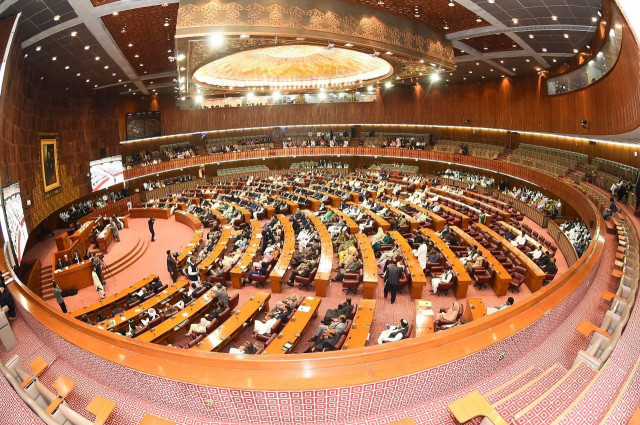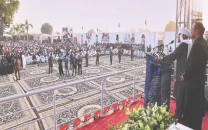Parliament rushes through bill trimming CJP’s powers
Also, parliament adopts resolution emphasising on holding general elections at the same time across the country

The joint sitting of parliament passed on Monday the Supreme Court (Practice and Procedure) Bill, 2023, with amendments days after President Dr Arif Alvi returned the bill seeking to curtail the Chief Justice of Pakistan’s (CJP) powers to initiate suo motu and constitute benches amid protest by the PTI senators.
Also, the joint session adopted a resolution emphasising on holding general elections of the national and the provincial assemblies at the same time across the country to strengthen the federation and to prevent polls from being influenced with results in Punjab first.
The parliament passed the bill amid an ongoing tussle between the government and the judiciary on the Punjab polls case.
Recently, a three-member Supreme Court bench led by CJP Umar Ata Bandial and comprising Justice Ijazul Ahsan and Justice Munib Akhtar announced the verdict on the PTI’s petition challenging the ECP’s move to postpone Punjab Assembly polls till October 8 from April 30.
The CJP announced that general elections of the Punjab Assembly would be held on May 14, declaring the ECP’s decision “unconstitutional”.
Read more: President returns bill limiting CJ's powers to parliament
The government side, however, termed the order contrary to the judgments of apex court’s majority judges, saying “it is an ‘impractical order’”.
Apart from expressing no trust in the CJP, the government also demanded that the top judge should step down over his “controversial” choices that he made while directing the polls supervisory body to hold elections in Punjab.
Minister for Law and Justice Azam Nazeer Tarar moved the bill, read out the objections of the president with a direction to reconsider, saying the bill was discussed in detail in the National Assembly and Senate and was approved by both the houses.
The president, who belongs to PTI, had sent back the bill for reconsideration to the parliament as per the provisions of Article 75 of the Constitution.
While responding to the president’s objections, the law minister said that Alvi had used inappropriate words while returning the bill and used a biased approach, saying he should think as the president rather than a political worker.
Parliament in its Joint session passes 'The Supreme Court (Practice and Procedure) Bill, 2023'.
— National Assembly of 🇵🇰 (@NAofPakistan) April 10, 2023
The bill was presented by Minister for Law and Justice @AzamNazeerTarar. pic.twitter.com/LnUcO32zZR
The minister said that the clauses in the bill were a longstanding demand of the bar associations, saying it aims to end the indiscriminate use of Article 184(3) of the Constitution.
Later, PML-N lawmaker Shaza Fatima Khawaja tabled amendments in the Supreme Court’s bill.
Her amendments in clause 2 stated that sub-clause 2 shall be re-numbered as sub-clause 3 and for the existing sub-clause 2 it should be substituted: “soon after commencement of this Act, the Committee constituted under sub-section (1) shall hold its first meeting to determine its procedure, including for holding meetings, and constitution of benches etc.”
“Provided that,” the amendment added, “till such time the procedure is determined under this sub-section, the meeting of the Committee for the purpose of sub-section, the meeting of the Committee for the purpose of sub-section (1) shall be convened by the Chief Justice or other two members of the Committee, as the case may be.”
The amendments moved in the bill by Shaza were not opposed by the law minister, saying the amendments would bring more clarity in the judicial affairs and ensure transparency while forming benches and exercising suo motu jurisdiction.
Subsequently, the joint sitting of parliament held with National Assembly Speaker Raja Pervaiz Ashraf in the chair reconsidered it and passed the legislative proposal.
Former law minister and Senator Farooq H Naek as well as JUI-F Senator Kamran Murtaza also spoke on various sections of the bill and opined that it would ensure judicial independence and help ending “one-man show” in the Supreme Court.
Meanwhile, the amendment of JI Senator Mushtaq Ahmed calling for an end to judicial and establishment’s interference into political affairs was rejected.
Following the passage of the bill from the joint session, the president shall give his assent within 10 days as the bill would automatically become a law even if Alvi does not give his assent under Article 75 of the Constitution.
Article 75 (2) of the Constitution of Pakistan states: “When the President has returned a Bill to the Majlis-e-Shoora (Parliament), it shall be reconsidered by the Majlis-e-Shoora (Parliament) in joint sitting and, if it is again passed, with or without amendment, by the Majlis-e-Shoora (Parliament), by the votes of the majority of the members of both Houses present and voting; it shall be deemed for the purposes of the Constitution to have been passed by both Houses and shall be presented to the President, and the President shall give his assent within ten days, failing which such assent shall be deemed to have been given.”
Through the bill, the government has curtailed CJP’s powers of taking suo motu notice and constituting benches, proposing that a three-member committee comprising senior judges, including CJP, should decide such matters as it would bring more transparency in the judicial affairs.
Meanwhile, Federal Minister for Parliamentary Affairs Murtaza Javed Abbasi and Senator Kamran Murtaza moved two identical resolutions seeking elections on the same day across the country and aimed at promoting political stability as well as unity among the provinces.
The resolutions stated that general elections of all the assemblies should be held simultaneously under neutral caretaker set ups to ensure impartiality and fairness during the elections.
During the session, the PTI senators staged a token walkout from the house to register their protest.
“Hold elections and save the country,” the PTI senators shouted.
Among other things, the bill gives the right to appeal in the suo motu cases as well grants a party the right to appoint its counsel of choice for filing a review application.
The bill says that the appeal will lie within 30 days of the bench’s order to a larger Supreme Court bench, adding that it would be fixed for hearing within a period not exceeding 14 days.



















COMMENTS
Comments are moderated and generally will be posted if they are on-topic and not abusive.
For more information, please see our Comments FAQ